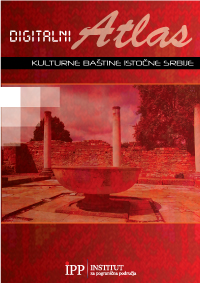News
The realization of the project "New Sustainable Rural Tourism Learning Opportunities for Women in Border Areas – New Low" is underway.
23. february 2023
The general goal of the project is to improve the capacity of women for rural tourism in border areas.
Activities:
- Development and definition of training methodology for rural tourism in border areas
- Establishing a digital platform for training women for rural tourism
- Pilot training of women from border areas for rural tourism
- The project is implemented within the Erasmus + program, lasting 12 months.
2. november 2022
Two studies were done:
- On the level of digitization of cultural organizations from European countries and third countries i
- Visitors to museums, galleries and other cultural institutions
Within the project "Interactive platform for digitalization of museums", financed under the Erasmus+ program, two studies were carried out:
- On the level of digitalization of cultural organizations from European countries and third countries, which aims to analyze the level of digitalization of museums, galleries and cultural organizations from European countries and third countries and
- a study that aims to analyze what visitors look for and expect to see during a visit to museums, galleries and other cultural institutions.
Intangible cultural heritage of Zaječar district on social networks
15. september 2022
In order to comprehensively and more accessible promotion of the cultural heritage of the Zajecar district, we launched social networks on this topic.
Follow us on Facebook: Intangible cultural heritage of the Zajecar district and Instagram @kulturnabastinaza
Get to know the Digital Intangible Cultural Heritage of Zaječar and Vidin Districts
10. december.2021
Intangible cultural heritage can be heritage only when it is recognized as such by the communities, groups and individuals who create, maintain and transmit it. For this reason, the "Digital Intangible Cultural Heritage" project is focused on collecting, preserving and promoting the intangible cultural heritage of both regions. In order to achieve greater promotion of intangible cultural heritage, digital technologies will be used as a new modern tool for the preservation and promotion of intangible cultural heritage.
The project will have a strong cross-border impact because it will:
To preserve and promote the intangible cultural heritage of both regions, which have great and undeveloped potential
Raising awareness of intangible cultural heritage assets in the cross-border region;
Develop modern digital tools for the promotion of intangible cultural heritage beyond the targeted borders;
Establish sustainable policies for its continued digital preservation and conservation.
The project was implemented on the territory of the Vidin and Zaječar regions.
Needs, weaknesses and limitations: Vidin and Zaječar are not known as regions with rich cultural intangible heritage. Both regions do not have a single database for intangible cultural heritage. In both regions, people who are interested in intangible cultural heritage still have nowhere to find detailed information about it.
The main problem is the low popularity of intangible cultural heritage among the local population.
Strengths and innovations: The project offers an innovative solution (protection, preservation and promotion of intangible cultural heritage through digitization). In this way, wider free access to information for the intangible cultural heritage of both regions will be enabled. The idea of the project is to use a modern ICT tool to preserve and promote the intangible cultural heritage of both regions, to increase the awareness of the target groups about the intangible cultural heritage (tradition, religious feast, folk dances and songs, fairy tales, stories, etc.); create a unique cross-border e-platform of intangible cultural heritage and create preconditions for the future creation of new tourism products in the region for intangible cultural heritage.
For more information, visit https://www.digitalich-bgrs.info
Presented recommendations to the municipality of Knjaževac for the management of biodegradable waste
2019
You can download the recommendations here.
An international conference on cultural heritage and the EU was held
6 may 2018
As part of the project "Countering Euroscepticism through Cultural Heritage Preservation", an international conference of the same name was held from May 4 to 6, 2018, in the House of Culture in Knjaževac.
The aim of the conference was to collect and present the experiences of 7 countries regarding the preservation of cultural heritage and Euroscepticism, that is, to:
show the values and potential of cultural heritage as a strategic resource for the EU;
encourage citizen participation and interaction with local, national and EU institutions in debates on how to improve the protection of cultural heritage and identity;
promotes the inclusion of citizens in the EU decision-making process.
The conference was officially opened by:
- Milan Đokić, president of the municipality of Knjaževac
- Tamara Delić, Assistant Minister of the Ministry for European Integration
- Stefan Gajić, adviser in the Ministry of Culture and Information,
- Vladan Jeremić, director of the Regional Agency for the Development of Eastern Serbia - RARIS
Representatives of 16 partner organizations, project participants spoke about cultural heritage, identity, experiences, EU funds and realized projects:
- Municipality of Knjaževac (Serbia)
- Institute for Border Areas (Serbia)
- RIS Rakičan Castle (Slovenia)
- Municipality of Montana (Bulgaria)
- Municipality of Kula (Bulgaria)
- Municipality of Ružinci (Bulgaria)
- Center for Innovation and Development Vidin (Bulgaria)
- Regional Development Agency and Business Center 2000 Montana (Bulgaria)
- Historical Museum of Bosnia and Herzegovina (Bosnia and Herzegovina)
- Municipality of Ernestinovo (Croatia)
- Municipality of Erdut (Croatia)
- Municipality of Probištip (Macedonia)
- Municipality of Kočani (Macedonia)
- Municipality of Berovo (Macedonia)
- National Institute and Museum of Bitola (Macedonia)
- Municipality of Tivat (Montenegro)
During the three days of the conference, 143 participants gathered: 56 from Serbia, 36 from Bulgaria, 25 from Macedonia, 10 from Croatia, 6 from Bosnia and Herzegovina, 6 from Montenegro and 4 participants from Slovenia.
The first day was reserved for presenting the work of partner organizations, the second for presentations on the preservation of cultural heritage.
The next two days were devoted to the values and potential of cultural heritage as a strategic resource of the EU, to encouraging citizens to improve the protection of cultural heritage and to involve them in the EU decision-making process. During the second day, an open space was organized, designed according to the principle of "speed dating", which enabled all participants to talk to each other and actively participate in the design of joint activities and future projects. Also, on the second day, a visit to the Native Museum was organized.
On the third day, the results and impressions of the conference were summarized, future cooperation and projects were discussed. After that, the participants had the opportunity to visit the "Prayer under Midžor" event and the Archaeo-ethno park in Ravna and try the traditional food of Eastern Serbia.
The conference was organized by the Institute for Border Areas in cooperation with the municipality of Knjaževac and 15 partner organizations, within the project "C-Count (Countering Euroscepticism through Cultural Heritage Preservation)" supported by the European program Europe for Citizens (Town Twinning).

Presentation of digital tourist map of Knjazevac municiality
1st December 2017
In order to improve visibility, availability of information and promotion of tourist offer of Knjazevac municipality, 1st December 2017 in Knjazevac was presented the Digital tourist map of Knjazevac.
Digital Tourist Map is based on 'Google maps' platforms and provides a quick and easy overview of the tourist offer of Knjazevac, such as attractions, accommodations, facilities of rural tourism, restaurants, wineries, sport facilities, picnic and so on.
Digital map Tourist is free to download and for further use. It is available at www.mapa.knjazevac.rs
Digital tourist maps Knjaževca is made by the Institute for pgranična areas with the help of the Tourist Organization of Knjaževac and support of the Municipality of Knjaževac.
Promotion of Digital Atlas of the cultural heritage of eastern Serbia
13th April 2016
Digital Atlas of the cultural heritage of eastern Serbia was presented on 13th April 2016 in Regional development agency of eastern Serbia in Zajecar
The promotion was attended by representatives of institutions and organizations dealing with cultural heritage in the region of eastern Serbia, as well as citizens interested in this topic.
The overall objective of this multi-lingual interactive web platform is to emphasize the importance of innovation in the processing and storing of information, the establishment of additional affirmation of the rich cultural heritage of the region and highlighting their tourist importance.
Digital atlas of cultural heritage of eastern Serbia was formed in partnership of the Institute for the border areas with RARIS (Regional Development Agency of Eastern Serbia), Museum of Knjazevac, the National Museum in Zajecar and cooperation of 22 organizations and institutions dealing with cultural heritage in Eastern Serbia . These organizations and institutions are also proponents of examples of cultural heritage contained in the Digital Atlas.
The project was implemented with the assistance of the Ministry of Trade, Tourism and Telecommunications (http://mtt.gov.rs).
Conference ‘’The future of border regions towards the EU’’
17th March 2016
Within the project ''The future of the border regions and the EU ', 16h and 17h March in Knjazevac was held the conference ''The future of border regions towards the EU''.
The conference was organized by the Institute for border areas and RARIS (Regional Development Agency of Eastern Serbia). The aim of the conference is to help the Serbian border regions to be better prepared for EU integration. The conference presented the process of EU integration and its impact on the border regions of Serbia. This event brought together more than 80 representatives of local government, business and civil society in Eastern Serbia.
The following topics was discussed:
- The process of EU integration,
- Experiences of other countries in the development of the border regions especially during the accession to the EU,
- Local Government and the EU accession process,
- The character of EU accession for the operation of small and medium-sized enterprises,
- Support Programs border areas during the EU accession process,
- Other issues of importance for the development of border areas.
The participants of the conference were:
- Nataša Dragojlović, coordinator of the National Convention on the EU;
- Hudolin Steffen, head of the surgery department - II - EU Delegation to Serbia;
- Detelin Dimitrov, Advisor at the Embassy of the Republic of Bulgaria to the Republic of Serbia;
- Stefan Imre, Advisor to the Minister of Economy of the Republic of Romania;
- dr. Alexander Grunauer, the leader of the project 'Local economic development in the Danube region'';
- Ivan Knežević, Deputy Secretary General of the European Movement in Serbia;
- Vasilij Stanic, an associate of the Office for European Integration;
- Djordje Staničić, Secretary General of the Standing Conference of Towns and Municipalities;
- Marina Tadić, advisor for international cooperation of the Office for Cooperation with civil society;
- Nebojša Matijašević, project manager GIZ project 'Support to the EU Accession Negotiation in Serbia' ';
- Boban Kostandinović, project manager RARIS program 'Year of Entrepreneurship' '
- Igor Mladenovic, an adviser to the Enterprise Europe Network;
- prof. dr. Slavenko Grgurević, director of the Union of Employers of Serbia;
- Maja Jovanovic, Project Manager-IPA CBC Program Serbia -Bulgaria;
- Zoran Milovanovic, project manager RARIS, the program '' Veni, Vino, Vici ";
- Mladen Radosavljevic, the leader of the '' New Energy for Stara Planina''.
Download presentations from the conference:
- Institucionalni okvir za pregovore sa EU
- CBC cooperation_Romanian experience in development of border regions of EU
- Bulgaria – Serbia IPA Cross-border Programme 2007 – 2013
- Pogranični regioni u Srbiji na putu pristupanja EU
- SEIO - Programi prekogranične i transnacionalne saradnje 2014 - 2020
- Kancelarija za saradnju sa civilnim društvom (www.civilnodrustvo.gov.rs)
- Program ''Evropa za gradjane i gradjanke'' 2016-2020
- Podrška malim i srednjim preduzećima u Srbiji
- Podrška pregovorima sa Evropskom unijom
- Razvoj MSP-a u nedovoljno razvijenim opštinama jugoistočne Srbije
After the conference it was made the reference: Conclusions of the conference ''The future of border regions towards the EU''. The document can be downloaded ovde.
The conference was held with the assistance of the Municipality of Knjaževac.










